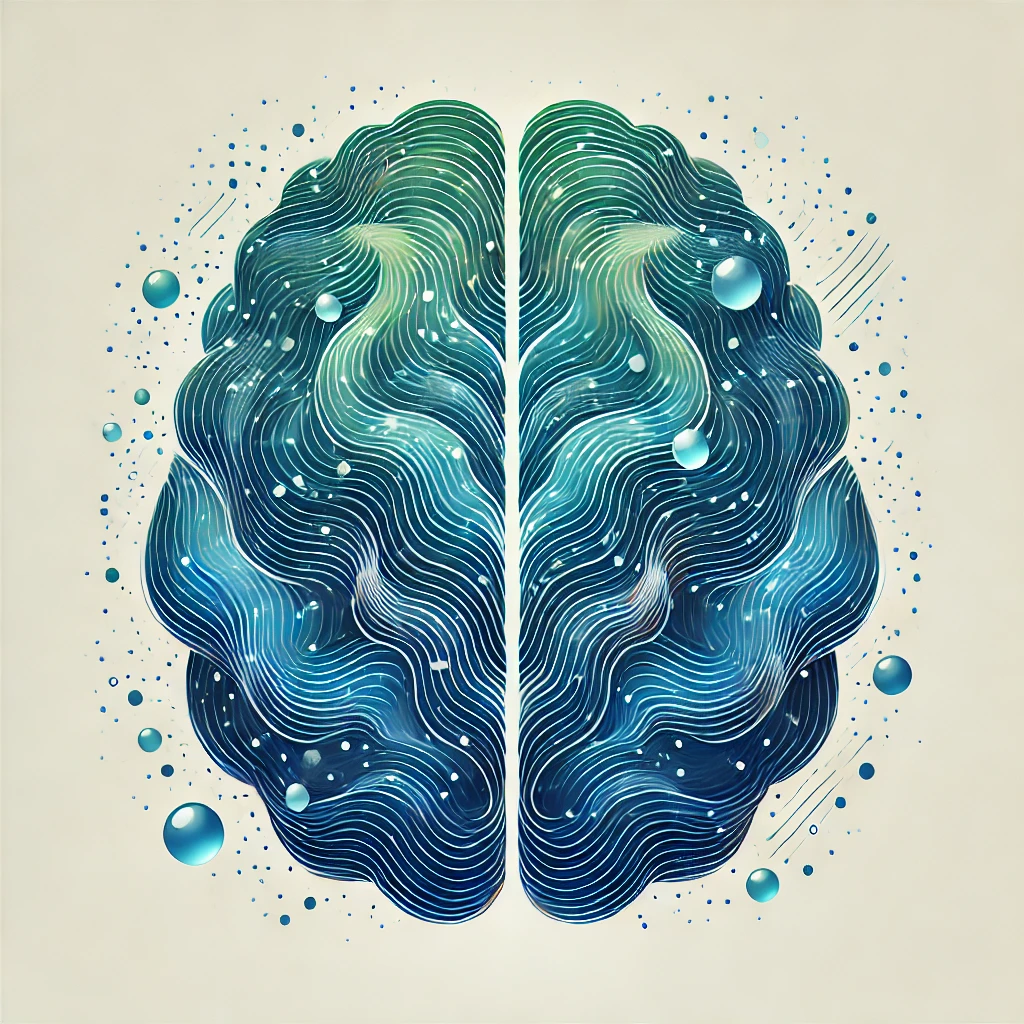Introduction
Why is drinking water essential for health and productivity?
Adequate hydration is often underestimated, but its impact on physical health, mental health and even productivity is profound. Keeping the body well hydrated can bring benefits ranging from improving cognitive function to supporting weight loss and muscle mass gain. This article explores the scientific reasons and effects of calculated hydration, adjusted for body weight and activity level, showing why drinking water is not just a basic necessity, but an essential strategy for achieving well-being and performance.
Part 1: Straight to the Point 🎯 – Basic Strategies and Practical Actions
Part 1, “Straight to the Point”, offers practical instructions and suggestions for immediate action.

1. Hydrate yourself in a calculated way
How do I know how many liters of water to drink a day?
Correct hydration is not a general concept; it must be adjusted to each person’s body weight and level of physical activity. To ensure the best benefits, follow the recommendation of 35 ml of water per kg of weight for sedentary individuals and 50 ml of water per kg for physically active people. This formula helps prevent both dehydration and excess water, ensuring that the body functions optimally.
2. Benefits for the Cognitive System and Productivity
Water plays a crucial role in brain function. The brain is made up of around 75% water, and even slight dehydration can impact on the ability to concentrate, reaction time and even mood. Studies show that a slight loss of 1 to 2% of body water volume can already compromise memory and cognitive function, directly impacting productivity.
3. Aids in weight loss
Adequate hydration is a powerful tool for weight control. The body often confuses thirst with hunger, leading to unnecessary calorie consumption. In addition, water contributes to the feeling of satiety, making it easier to adhere to a balanced and healthy diet. Drinking a glass of water before meals can help control appetite, promoting more conscious and lighter eating.
4. Gain muscle mass
For those looking to gain muscle mass, hydration is essential. Water plays an active role in transporting nutrients to the muscles and helps with post-workout recovery. In addition, water lubricates the joints, reducing the risk of injury, and helps balance electrolytes, which are essential for muscle function.
5. Intestinal health and efficient digestion
Keeping the body hydrated promotes the proper functioning of the digestive and intestinal systems. Water is vital for digestion and the absorption of nutrients, as well as facilitating the elimination of toxins from the body. Well-hydrated people have a lower risk of constipation and intestinal problems, as water helps to soften the stool and promotes healthy intestinal transit.
6. Increases Adherence to Diet and Healthy Lifestyle
As mentioned, the confusion between thirst and hunger can cause many people to eat more than necessary. By adopting conscious hydration, it’s easier to recognize the signs of hunger and thirst differently, helping adherence to a balanced diet and promoting a healthier relationship with food.
Do you want me to continue with the scientific section, where we’ll cover the studies and explanations that support these points?
Part 2: Explaining the Concept Cientificamente👨🏻🔬 -Deepening your knowledge
Part 2, “Explaining the Concept Scientifically”, provides a scientifically-based in-depth look at the “whys” and more detailed explanations of the suggestions made in Part 1

The importance of hydration is widely supported by science. From cellular physiology to neurological function and metabolism, the role of water in the body is fundamental and complex. Here, we explore the scientific basis that supports the benefits cited, highlighting how each system is impacted by adequate water intake.
1. Hydration and Cognitive Function
The human brain is highly dependent on water to function optimally. As mentioned, it is largely composed of water, and even mild dehydration can cause changes in cognition and mood. Studies published in the Journal of the American College of Nutrition show that dehydration can increase the perception of tasks as more difficult and decrease performance in mental activities.
Dehydration directly affects brain volume, which can cause headaches and mental fatigue. With the loss of just 1% of body weight in water, cognitive deficits can already occur, including difficulty focusing and short-term memory. In addition, water helps circulate nutrients and oxygen to the brain, contributing to mental clarity and reducing tiredness.
2. Hydration and weight loss
Water is essential for the process of thermogenesis – the production of heat by the body, which contributes to daily calorie expenditure. Research indicates that drinking cold water can increase thermogenesis, as the body has to work to heat up the water ingested, expending energy in the process. In addition, drinking water before meals has been proven to promote satiety, resulting in a natural reduction in calorie intake.
The American Journal of Clinical Nutrition publishes studies suggesting that drinking around 500 ml of water before meals can reduce calorie consumption during the following meal by up to 13%, helping to reduce weight over time. Combined with healthy eating habits, regular hydration is a valuable strategy for weight control and weight loss.
3. Hydration and muscle mass
For those who practice physical activity with the aim of gaining muscle mass, hydration is essential. During exercise, the body loses a significant amount of water through sweat, which can lead to dehydration if not adequately replenished. Water is essential for protein synthesis – the process by which the body rebuilds and strengthens muscle fibers after training.
Studies published in the Sports Medicine Journal show that adequate hydration increases the efficiency of muscles in performing contractions and reduces the risk of cramps and injuries, critical factors for those seeking to increase muscle mass. Water also helps eliminate lactic acid from the muscles, reducing muscle soreness and speeding up recovery.
4. Digestive health and hydration
The role of water in digestion is complex and profound. It is essential for the production of saliva, which initiates the digestion of food in the mouth. In the stomach, water helps break down food, facilitating the absorption of nutrients and promoting a healthy gut. Insufficient hydration is associated with constipation, as the body tends to reabsorb water from the intestine, making it difficult for the stool to pass.
The National Institute of Diabetes and Digestive and Kidney Diseases recommends that adequate water intake be incorporated into daily life as a way of preventing and treating constipation. Water facilitates intestinal transit and helps balance the intestinal microbiota, which has a direct impact on the immune system and general well-being.
5. Differentiating between thirst and hunger
The hypothalamus, a region of the brain responsible for regulating thirst and hunger, can confuse these signals in situations of mild dehydration. For this reason, many people may feel hungry when they are actually thirsty. Drinking water regularly throughout the day helps the brain differentiate between hunger and thirst signals and helps regulate appetite. A study in the Physiology & Behavior Journal showed that people who are properly hydrated tend to consume fewer calories during the day.
This relationship between thirst and hunger is useful for those who want to follow a balanced and healthy diet, as it reduces the risk of excessive calorie consumption throughout the day, improving the nutritional quality of the diet and helping to maintain a healthy weight.
Conclusion
Adequate hydration is a fundamental pillar for physical and mental health. Adopting calculated hydration, taking into account your weight and level of physical activity, maximizes the benefits for your body, from cognitive performance to helping you lose weight and gain muscle mass. Small changes, such as increasing water consumption throughout the day and maintaining a hydration routine before meals, can make a big difference to your health and well-being.
To put this into practice, start with the following actions next week:
- Calculate your daily water requirement and distribute your intake throughout the day.
- Drink a glass of water before meals to control your appetite.
- Always carry a bottle of water with you and monitor your daily consumption.
These steps will help you establish a healthy hydration routine and increase your energy, concentration and disposition for daily activities.

Kelton Tartarotti, a specialist in Health, Longevity and Lifestyle Reprogramming, brings an innovative approach to corporate and personal well-being in the Tartarotti Report. With a comprehensive background in Physical Education, including a BA, BSc and post-graduate studies in the Physiological Basis of Personalized Training and Sports Nutrition, Kelton has a solid foundation in sports and health sciences.
He is registered with the Regional Council of Physical Education (CREF-ES) under number: 005334-G/ES
His experience includes:
International certification as a Personal Trainer by the World Fitness Association (Florida/USA)
Coaching training by ABRACOACH
Specialization in Integrative Functional Health
15 years as a physical trainer for elite MMA athletes in world events
Working as a Physical Trainer at the Espírito Santo Olympic Center (COES)
In the Tartarotti Report, Kelton offers valuable insights into:
Scientifically-based executive health protocols
Stress management and resilience techniques for leaders
Sleep optimization strategies for cognitive performance
Functional nutrition adapted to corporate life
Efficient exercise programs for busy schedules







